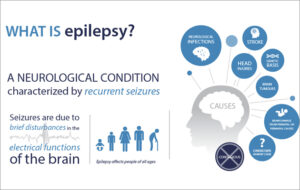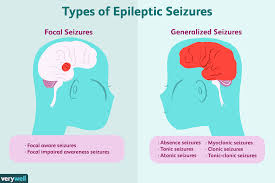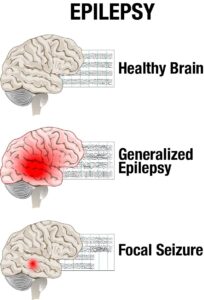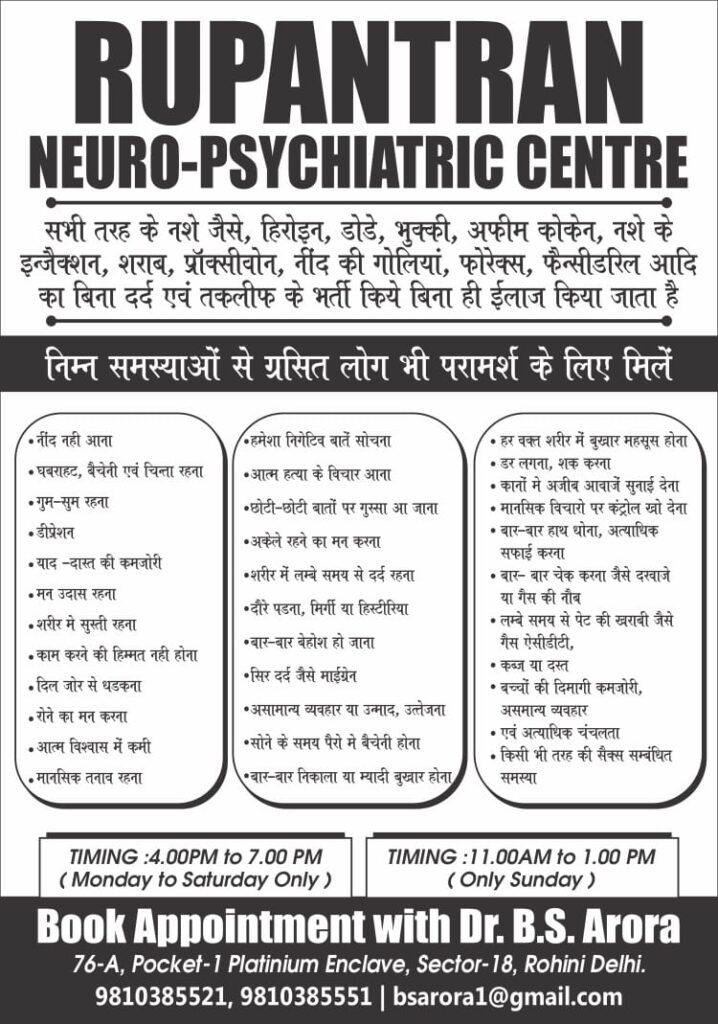
What is Epilepsy?
Epilepsy is a chronic neurological disorder that causes recurrent seizures. When there is a sudden rush of electrical activity occurs in the brain, immediately seizure starts. Generalised seizures and partial seizures are two types of seizures. The first one affects the entire brain whereas the latter affects a part of the brain.
It is hard to recognize a mild seizure that can last for a few seconds during that condition the patients may be unconscious. Strong seizures develop uncontrollable muscle twitches, spasms and last for several minutes. During this time, some patients will feel confused or lose consciousness. Anybody can develop with epilepsy; however, it is quite common in adults and young children. It occurs slightly more in males than females.
What are the Symptoms Of Epilepsy?
Epilepsy is a disorder or any abnormal activity caused in the brain which affects the coordination process. The symptoms depend upon the type of seizure and the seizure is categorized into two types by the doctors:
Focal seizure: This is also called partial seizures and occur in one part of the brain. The symptoms include mental illness, narcolepsy or migraine.
Generalized seizures: This type of seizures involve every part of your brain. The symptoms involve lip-smacking or blinking, sudden collapse or fall down, jerking or repetitive muscle movements.
The general symptoms of epilepsy are as follows:
- Staring spell
- Temporary confusion
- Uncontrolled jerking of hands or legs
- Loss of awareness or consciousness
- Psychotic symptoms which include anxiety
- Fear
- Deja vu
What is the Root Cause of Epilepsy?
The cause of epilepsy is not identifiable but the traces have been found which include:
- Genetic influence:
Sometimes epilepsy also run in the family thus it is called having a genetic influence. There are some kinds of epilepsy which are linked to specific genes and some also get triggered due to certain environmental changes.
- Head trauma:
This can be the result of an accident or any severe injury.
- Brain condition:
The condition of the brain is also very important as if there is any damage, stroke or trauma then it can cause epilepsy.
- Infectious disease:
Like AIDS, meningitis, and viral encephalitis can be one of the causes for epilepsy.
What are the Precautions for Epilepsy?
- Blood sugar and sodium are at abnormal levels
- Get plenty of sleep, keep a sleep schedule and stick to it
- Avoid taking drugs and alcohol
- Avoid playing video games, watching TV and computers continuously
- Do not skip the medicines prescribed by your doctor
- Try to cope up with a healthy diet plan
- Replace glass with plastic in order to avoid cuts during seizures
- Swimming alone should be avoided
- Wear a helmet while biking, hiking, playing to avoid head injuries
- Don’t use the electrical appliance near water, in case of seizure you may electrocute yourself
- Take showers instead of baths
- Keep the doors, windows open. During the seizure time, your loved ones may approach you fast
- Make your child or the patient wear a medical alert bracelet at all times
- Educate your child or the patient about his or her medical conditions, precautionary methods during seizures.
- Assist the patients during washroom or other activities if the patient is an elderly person.

How to Diagnose Epilepsy?
To diagnose epilepsy doctor may recommend various tests that include the following:
- A neurological exam:
If have any behavioural change or change in motor abilities or in any problem in body part then you will be recommended neurological exam.
- Blood test:
It will be done in order to test if there is any infection or disease in the body which can affect the brain and is associated with seizures or not.
- Electroencephalogram (EEG):
This test is the most common test that is done to diagnose epilepsy in which electrodes are attached to the scalp in order to detect the activity of the brain.
- Computerized tomography (CT) scan:
A CT scan is done in order to get the cross-sectional image of the brain. Through this scan abnormalities in the brain can be diagnosed properly.
- Magnetic resonance imaging (MRI):
In this with the help of radio and magnetic waves detailed view of the brain is given. This helps the doctor to determine the exact problem which can be either cyst, bleeding, tumor, etc.
- Positron emission tomography (PET):
A very low level of radioactive material is injected in the brain in order to determine the active areas or the brain and abnormalities as well.
What is the Most Common Treatment for Epilepsy?
Treatment for epilepsy are as follows:
· 1. Medication: It has been seen that most of the time anti-seizure medication can cure or help in curing seizures. These medications are also known as anti-epileptic medication. But these medications also have some side effects which include: weight gain Fatigue, dizziness, loss of coordination, skin rash, loss of bone density, and speech problems.
2. Surgery: When medication stopped working then and the seizure starts becoming out of control then the last option left is surgery. In this, area which is affected with epilepsy is removed from the brain. Although medications are still given after the surgery the dosage is reduced.
3. Therapies:
- Vagus nerve stimulation:
In this device is implanted by the doctor which is known as vagus nerve stimulator. It is implanted under the chest skin and it is similar to a pacemaker. After this stimulator wires are connected to the nerve in the neck.
- Ketogenic diet:
This is very helpful during epilepsy and may people who suffer from epilepsy have reduced the symptoms of seizure by following the ketogenic diet which is high in fats and low in carbohydrates.
- Deep brain stimulation:
In deep brain stimulation electrodes are implanted in the specific part of your brain (thalamus) by the doctor. A generator is implanted in the chest and the electrodes are connected with it which sends electric impulses to the brain thus reducing seizure.

What are the side effects for the epilepsy treatment?
Side effects include:
- Rash
- Prolonged fever
- Mouth ulcers
- Sore throat
- Weakness
- Pinpoint bleeding
- Excessive fatigue
- Increased seizure
- Excessive fatigue
- Severe throat pain
What are the Risk factors for epilepsy?
These are the factors which may increase the risk of epilepsy:
- Age:
It plays a very important factor in epilepsy as it mostly occurs in childhood or in older adults. But this condition may occur at any age.
- Family history:
If any member of the family is suffering or has suffered through epilepsy then there can be a risk of developing a seizure disorder.
- Dementia:
If you have dementia then the risk of epilepsy increases by itself.
- Brain infection:
Infection or diseases such as meningitis can cause inflammation or in the spinal cord thus increasing the risk.
- Stroke or another vascular disease:
If you have the problem of stroke or any other vascular disease then it can damage the brain and can result in epilepsy.
What are the Complications for epilepsy?
These are the following complications that can happen due to epilepsy:
- Falling:
If you have a sudden stroke or seizure then you may fall down which may lead to severe injuries like breaking or bone or head injury.
- Drowning:
If you suffer from seizure or stroke then the chance of drowning increases up to 15-19 times more than other people. So one must be careful while swimming or bathing in a river.
- Accidents:
If you are driving and have a problem of seizure then being cautious is important as there can be abnormal activities in the body thus it can make operating a vehicle dangerously.
- The complication in pregnancy:
If a mother suffers from seizure during pregnancy then it is dangerous for the baby as well as for the mother because taking anti-epileptic medications at times increases the risk of defects in the babies.
- Emotional issues:
A person with epilepsy have more risk of developing any emotional issues like suicidal thoughts, depression, anxiety. It becomes very hard for the person to control these feelings.
What Foods Can Trigger Epilepsy?
Some of the foods that can alleviate the conditions during epilepsy or trigger seizures are as follows: Soy Products: Soy mostly triggers allergies and seizures in children that is found in many baby foods. Try to scrutiny the soy-free product before feeding your children.
- Dairy Products: In recent decades, it has been found that dairy products induce allergies among children. So, cut down the usage of dairy products in order to reduce the episodes of seizures.
- Gluten: Some people have gluten-intolerance. The proteins in the grains have an inflammatory property that would trigger seizures.
- Sleep deprivation is a predominant trigger for seizures. Hence, have enough sleep
Antibiotics like penicillin and painkillers like tramadol might increase the risk of seizures

If you need help form my team ,feel free to contact my team .
Mobile-9810385521
Email [email protected]
www.psycareco.in